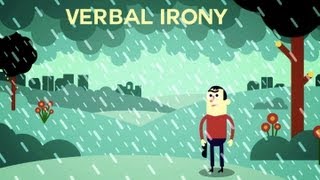(单词翻译:单击)
Great weather we're having! Awesome job! You're a tremendous athlete!
我们可真赶上了个好天气!干得漂亮!你真是个了不起的运动员!
Compliments, right? Well, maybe.
赞扬的话,对吧?或许吧。
Depending on the attitude and tone of voice behind these lines, they very well may be compliments.
这要取决于讲话时的态度和语气,它们很有可能是赞誉。
They may also be, though, pointed and attacking lines.
却也有可能是尖锐的责难。
This slight change of attitude behind the lines reveals what we call verbal irony.
说话时细微的语气变化,形成了我们所谓的“反语”。
So when someone says, "Great weather we're having,"
当有人说:“我们真赶上了个好天气!”
it is quite possible that the person really means that if the sun is shining, the birds are singing, and the wind is calm.
的确有可能那人真的是指阳光明媚,鸟语花香,微风拂面。
But if the weather is horrible, the clouds are looming, and the wind is a raging tempest,
但如果天气很糟糕,乌云密布,狂风骤雨,
and someone says, "Great weather we're having," he probably doesn't actually mean that.
然后还有人说:“我们真赶上了个好天气!”,他很有可能想表达的并不是那个意思。
He probably means that the weather is horrible, but he has said the opposite.
他有可能想表达天气很糟糕,却说了相反的话。
This is verbal irony when the speaker says the opposite of what he means.
这就是反语,也就是讲话者说的话和话的意思相反。
I know what you're thinking. Isn't this sarcasm, isn't the speaker being sarcastic? Yes.
我知道你在想什么。这不是讽刺吗?讲话者不是在讽刺吗?是的。
When a speaker says the opposite of what he means, that is verbal irony.
当讲话者说的话和话的意思相反时,就是反语。
When a speaker then goes the step farther to mean the opposite of what he says
而当讲话者再进一步表达和他所说的话直接相反的内容时,
and seeks to be a little pointed and mean, like he's making fun of something, then you have sarcasm.
并且语气略显尖锐刻薄,好像在讥笑什么似的,就形成了讽刺。

Take the second example: "Awesome job!"
来看第二个例子。“干得漂亮!”
Someone accomplishing his life-long dream: awesome!
有人达成了人生理想:漂亮!
Someone winning a sports championship: awesome!
有人赢得了体育冠军:漂亮!
Someone rear-ends another car: not awesome.
有人追尾了别人的车:并不漂亮。
So when the passenger says, "Awesome job!", they probably mean the opposite with a hint of poking fun.
这时如果乘客说,“干得漂亮!”,他们大概就是在说相反的意思了,甚至还有一点取笑的意味。
That is verbal irony and that is sarcastic.
这就既是反语又是讽刺了。
"You're a talented athlete," said to an Olympian: authentic, no verbal irony present.
如果对一个奥林匹克运动员说,“你真是个有天赋的运动员。”这就很真诚,并不包含反语。
Said to the klutzy kid tripping into English class and spilling his books and pencil case all over the room,
如果对一个跌跌撞撞地走进英语教室,还把他的课本和铅笔盒散得满教室都是的孩子说这句话,
now that is just harsh and verbally ironic because what you said is not what you meant. That is verbal irony.
这就不只是语言戏谑而刺耳了,因为你说话的内容并不是你想表达的意思。这是反语。
You have said the opposite of what you mean.
你说话的内容与你想表达的意思相反。
Additionally, since you have the intention of mocking this poor person,
除此之外,由于你是出于嘲笑弱小的心理,
you have not only been verbally ironic, but sarcastic as well. Beware, though.
你不仅仅是在说反话,还是在讽刺。但是,请记住。
While all sarcasm fits the definition of verbal irony, not all verbal irony is sarcastic.
尽管所有讽刺都是包含在反语里的,但不是所有的反语都是讽刺。
Verbal irony is where what is meant is the opposite of what is said, while sarcasm adds that little punch of attitude.
反语是指想表达的意思和表达内容相反,而讽刺则加重了说话时的语气。
There are times, though, where another layer of meaning can be present without that sarcastic tone.
但是,在个别情况下,我们可以表达深一层的含义,而不需要讽刺。
Alright, now go out there and find those examples of verbal irony and sarcasm.
好,现在就请大家在生活里寻找反语和讽刺的例子。
Good luck! No, seriously, I mean it, good luck.
祝你们好运!不开玩笑,我是认真的,祝你们好运。
No, no, really, I truly want to wish you luck on this difficult task.
不,我是认真的,我真心祝你们能攻克这个难题。
Ok, ok, sincerely good luck. You can do it! No verbal irony here.
好吧,好吧,我真心祝福你们。你能做得到!这回不是反语了。


